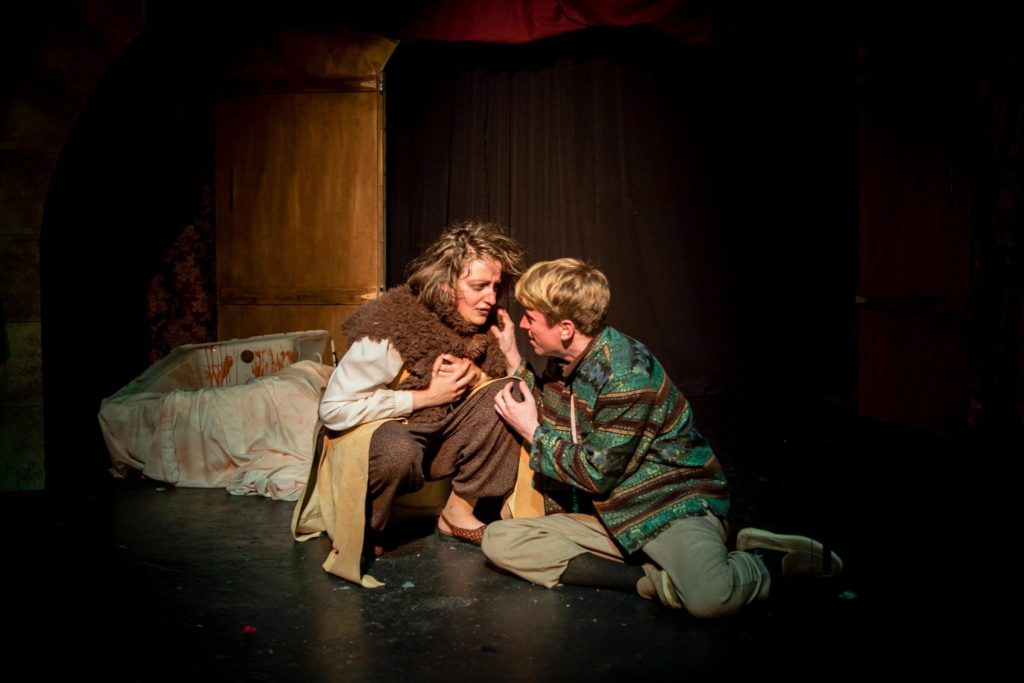
Helena Jo (Kaelea Rovinsky) and Count Drugeth (Nathan Ducker) discuss unrequited affections. Lighting by Benjamin Dionysus. Costumes by Delena Bradley. Photo by iNDie Grant Productions
For the vast majority of Countess Bathory, servants are either treated with scorn or ignored altogether. This is especially true of Helena Jo, who receives absent-minded rebukes more than anything else from Elizabeth. In Act 4, Scene 2, Helena has a couple of rare experiences: she briefly receives physical affection from the Countess, and Lord Drugeth speaks to her as an equal. In a sense, Drugeth even tries to convince her to abandon her cultish loyalty to Bathory, but this is ultimately unsuccessful.
For Drugeth, deigning to converse with a commoner is a sign of desperation. Drugeth scarcely speaks to Zavodsky despite his vested interest in the Adjunct’s investigation; he (like most) ignores Kate and later Jane, and even goes so far as to talk about the Witch behind her back in front of her face, like a piece of furniture. His disdain is by no means unusual, but it sets up a huge contrast with his actions in Act 4 (the only Act where he converses with commoners).
Drugeth was originally conceived as an amalgam of Othello‘s Rodrigo and a dime-store Iago: grand ambitions of clever manipulation, and entirely too susceptible to his feelings. Although there is still much to this, Drugeth is a privileged man scorned, like which Hell hath no fury. He sees himself reflected in Helena’s naive, confused, helpless, and above all wounded persona, and elects to not only abandon his unsolicited and unrequited worship, but moreover to punish the object of his misplaced affections. Drugeth’s similarities to the celebrity-worshipping middle class has been described before, but here we also see a resounding echo of the ego and privilege of a man. Elizabeth has deceived, seduced, manipulated, and tormented many people, but Drugeth was never one of them. She consistently rebuffs him, rebukes his open declarations of affection, and decries in no uncertain terms that he has no right to possess, command, or even appeal to her in any way. But Drugeth sees and hears what he wants, and decides to punish the imaginary spurning of his imaginary love in a way too cruel for any other adversary to devise.
In Act 5, Elizabeth is betrayed five times. The King betrays their noble blood for money, Thurzo betrays their familial love through indecision and inaction, Zavodsky betrays morality through her myopic dedication to the establishment, Drugeth betrays his professed love for spite, but Helena Jo’s betrayal is greatest of all: she betrays her religius devotion to Bathory because she is too weak to be a martyr.
But back to 4.2. This brief sequence between Helena Jo and Drugeth was originally conceived as a buffer between Bathory’s exit and the arrival of Zavodsky. Helena’s lines were there purely as a coy, slightly accusatory setup for Drugeth to perhaps qualify his epistles of love with some genuine feeling.
“What tokens, Lord, what signs of her Affection
Hath my Lady offer’d thee?”
This is the second time in the play when the word “token” is used as a direct contrast to blind faith. Ironically, Elizabeth’s own husband demonstrates how fragile and useless tokens can be once received.
When we finally rehearsed this scene, Helena (actor Kaelea Rovinsky) made the much more impactful choice of asking a question that affected her personally. Helena, who to date has received one token of affection in her time with Bathory (earlier in this very scene) asks Drugeth why he continues to pursue someone who so openly rejects him. It’s a valid question, and one that Helena can relate to. Elizabeth has a strange, intimate relationship with Kate; she shared loving moments with Anna Darvolya; she openly solicits the Witch Erzi Majorova’s council. Jane Maridova receives little affection, but she is validated and (after all) is allowed to keep her life after it is threatened. Helena Jo alone is consistently ignored or shunted aside, despite being Bathory’s most loyal zealot. It’s small wonder then that Drugeth chooses, briefly, to identify more with this wronged idoloter than the narcissistic nobles he more readily resembles.
In a monolog resembling Hortensio’s defiance of romantic love, Drugeth decides at 4.2’s end that there is no point in romanticism. Even Nadasdy, the only man to receive genuine love from Elizabeth, ultimately got little out of it. In the end, Drugeth is as pragmatic as anyone, and chooses cunning and cruelty over devotion. Considering Helena Jo’s fate, and the character of whom they worshipped, it is a little difficult to blame him, despite the revolting nature of his repentence.
“Oh would I could a Westerner become,
But I am chained like the Bruin, without
A star to pull me from my prison’d sight,
I fear I’ll stay and share my Lady’s plight.”
COUNTESS BATHORY is back, Thursday – Saturday. Reservations are full, but walkups are welcome.
June 9 – 25
Thursday, Friday, and Saturday at 7:30pm
4001 N Ravenswood Ave, Ste 405
ALL SEATS ARE FREE
